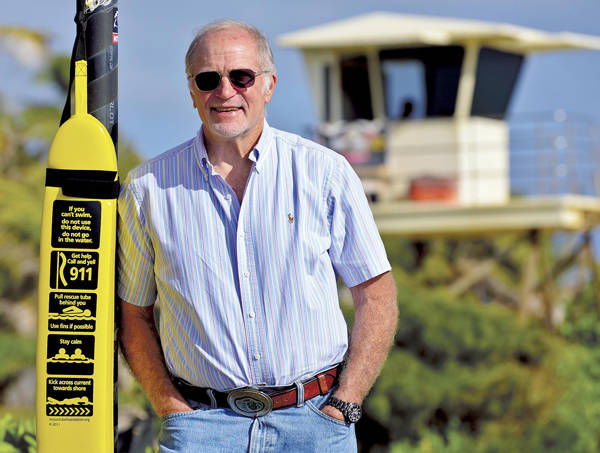HONOLULU — Lifeguards protecting county beaches will no longer be immune to lawsuits. On Thursday, the Senate approved SB 562, which relates to the sunset of Act 170, a measure that protects county lifeguards assigned to any beach from lawsuits.
HONOLULU — Lifeguards protecting county beaches will no longer be immune to lawsuits.
On Thursday, the Senate approved SB 562, which relates to the sunset of Act 170, a measure that protects county lifeguards assigned to any beach from lawsuits.
“Act 170 has been a very special honor and recognition for our lifeguards, one not granted to any other professionals. The fact that the Legislature has chosen to terminate it on June 30 this year is a slap in the face to our lifeguards’ morale,” said Dr. Monty Downs, president of the Kauai Lifeguard Association.
Act 170 is scheduled to sunset on June 30.
In its original version in January, SB 562 sought to make protections for county lifeguards permanent. But as it went through the legislative process, that provision was taken out. The bill now protects lifeguards only working at state beaches.
SB 562 will be discussed Senate and House meetings next week. If passed, it will go to Gov. David Ige for his signature.
The measure for continued lifeguard protection came at the request of the Hawaii State Association of Counties.
Stacy Crivello, Maui County Councilmember and president of HSAC, said she was disappointed at the Legislature’s decision not to extend the liability protection for lifeguards at county beaches past the sunset date of June 30.
“This move is devastating to the counties and the morale of lifeguards, who risk their lives everyday in keeping our residents and visitors safe at our Hawaii beaches,” she said.
When SB 562 was transmitted to the House of Representatives, the Judiciary Committee took out the language dealing with the sunset provision, and wrote the bill so it would give the attorney general the ability to defend any civil actions brought about by an “allegedly negligent or wrongful act or omission of persons employed by a county as lifeguards” only on state beaches.
“No other first responders, such as firefighters, police officers, or EMT ambulance personnel have statutory immunity to perform their duties at a level below reasonable care,” said House Judiciary Chair Rep. Scott Nishimoto, D-21, in a statement.
Another concern raised by the Judiciary Committee included taking a way a person’s ability to sue if something negligent happened on state beaches, said Rep. Jimmy Tokioka, D-15.
“I got the Chair of the Judiciary to to hear the bill, but by doing that, took out exemptions to lifeguards they’ve enjoyed for two decades,” he said. “I didn’t support that language, but I appreciate he at least heard it.”
On Kauai, only lifeguards who protect Ke‘e Beach, one of four state beaches manned by county lifeguards, will be protected from lawsuits, according HSAC.
Among the 406 county lifeguards throughout the state, only 30 are stationed on state beaches. Under the bill, 90 percent of ocean safety personnel stationed on county, public beaches would be vulnerable to frivolous lawsuits, according to the release.
As the bill moved the legislative process, Tokioka, Reps. Nadine Nakamura, D-14, and Dee Morikawa, D-16 worked to find a compromise.
“Kauai Legislators fought with everything they had to have the Act not be terminated, and many people across the state and from all walks of life, including mayors, county councilors, and private citizens, worked very hard on this as well,” Downs said.
Tokioka said extending the sunset deadline of Act 170 has been one of his top priorities since he was elected to the House of Representatives in 2007.
“I supported the measure from day I got here, and I want to make sure it provides indemnification for men and women guard beaches,” he said. “It’s hard for us to get good quality lifeguards when they don’t enjoy state protections.”
Despite the setback, Downs said he doesn’t foresee people seeking to sue lifeguards.
“If you weren’t grossly negligent you’re not going to lose a lawsuit, although without Act 170 you are more susceptible to being irritated by frivolous lawsuits,” he said.
He said the termination of Act 170 “doesn’t in any way change the dangers of our lifeguards’ job, when they’re flying to a troubled scene on a Jet Ski, just a speck in the ocean as they speed and pound their way to someone in distress, sometimes getting injured in the process. Or when they’re charging out with a rescue tube into dangerous surf in order to pull someone in to shore,” he said.


